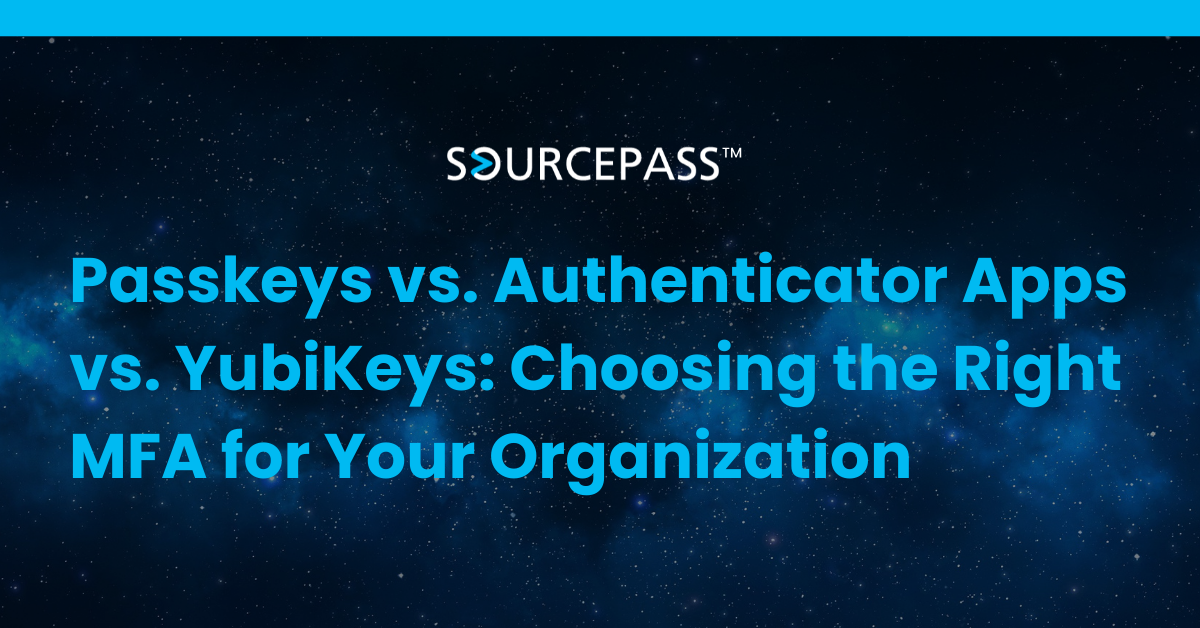Passkeys vs. Authenticator Apps vs. YubiKeys: Choosing the Right MFA
Aug 25, 2025 Alex Davis Industry - State & Local Government | Security & Compliance | Cybersecurity 2 min read



Which multi-factor authentication (MFA) method is most secure? Passkeys, authenticator apps, or YubiKeys?
In this expert guide, we compare three leading MFA solutions, explain their benefits and challenges, and help you match the right method to the right users. Whether you're protecting general workforce logins or high-risk admin accounts, this post breaks down what IT leaders need to know in 2025.
Why MFA Is No Longer Optional
Cyber threats are evolving fast, and legacy MFA methods—like SMS and email verification—are no longer secure enough. Modern MFA protects against phishing, token theft, and credential replay attacks, and is essential for maintaining compliance and business continuity.
Passkeys: Seamless and Phishing-Resistant
What Are Passkeys?
Passkeys are passwordless authentication credentials tied directly to a device and stored using cryptographic keys. Users sign in using biometric data or device PINs.
-
Security Benefits: Immune to phishing. Eliminates passwords entirely.
-
Challenges: Limited by device compatibility and OS requirements.
-
Best For: General users in organizations prioritizing ease-of-use and security.
📍 Used effectively by modern SMBs in industries like finance, healthcare, and real estate where security meets convenience.
Authenticator Apps: Flexible and Affordable
What Are Authenticator Apps?
Apps like Microsoft Authenticator and Google Authenticator generate time-based one-time passcodes (TOTPs) or push notifications.
-
Security Benefits: Stronger than SMS/email. Supports number matching.
-
Challenges: Still vulnerable to token theft or push fatigue. Requires user education.
-
Best For: Organizations upgrading from SMS MFA without major cost investment.
💡 Great starting point for companies without a dedicated IT security budget.
YubiKeys (FIDO2 Security Keys): The Gold Standard
What Are YubiKeys?
YubiKeys are hardware security keys that comply with FIDO2 protocols, enabling passwordless, phishing-resistant authentication.
-
Security Benefits: Immune to phishing, credential theft, and man-in-the-middle attacks.
-
Challenges: Hardware distribution, cost, and user training.
-
Best For: Admins, finance, legal, and executives with access to sensitive systems.
📈 Used by regulated industries like law, banking, and healthcare to meet compliance standards (HIPAA, SOX, FINRA, etc.).
MFA Strategy: Layer Your Protection
There is no universal MFA solution. The best strategy is tiered protection based on account sensitivity:
| User Type | Recommended MFA |
|---|---|
| General Employees | Authenticator Apps |
| Hybrid/Remote Workers | Passkeys |
| Executives/Admins | YubiKeys (FIDO2 Keys) |
Combine MFA with conditional access policies (see related article) for even stronger protection.
Local & Industry Application (GEO Optimization)
Whether you’re an SMB in New York, a construction firm in Texas, or a healthcare provider in California, MFA plays a critical role in meeting local and industry compliance mandates. For example:
-
HIPAA (Healthcare): Requires secure access to ePHI.
-
GLBA & SOX (Finance): Demands strong access controls.
-
CJIS/NIST (Government): Favors phishing-resistant authentication.
📍 Sourcepass helps clients nationwide deploy the right MFA stack—tailored to your business size, risk level, and IT environment.
Final Takeaways for Choosing the Right MFA
-
Passkeys: Great for user-friendly, secure logins.
-
Authenticator Apps: A reliable upgrade from SMS-based MFA.
-
YubiKeys: Best-in-class protection for high-risk roles.
🔒 Choose the right tool for the right role—and remember, layered MFA beats single-method approaches every time.
Need Help Implementing MFA? Sourcepass Can Help!
Sourcepass can help your team plan, deploy, and manage a secure MFA strategy that meets your business goals, compliance needs, and user experience expectations.
Subscribe To
Sourcepass Insights
Sourcepass Insights
Stay in the loop and never miss out on the latest updates by subscribing to our newsletter today!


